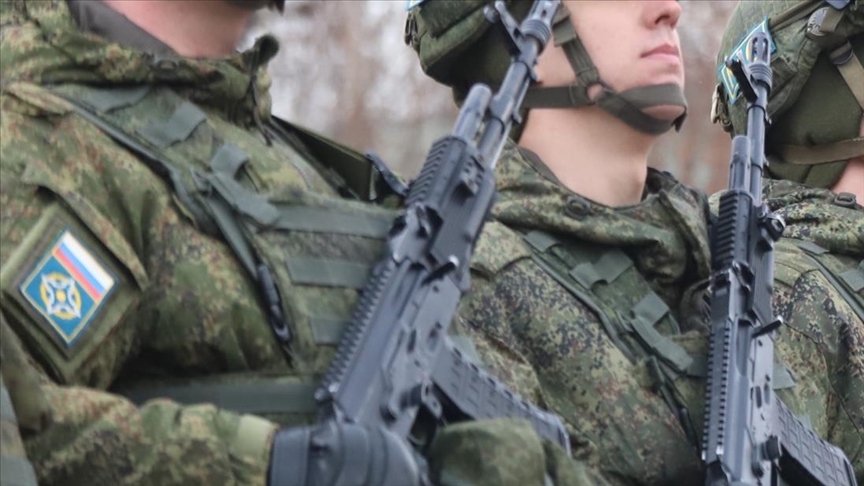Russia to examine Armenia's refusal to host CSTO military exercises, allowing joint drills with US
Kremlin spokesman says he has seen reports in Western media claiming that Armenia wishes to withdraw from CSTO, but no practical steps have been taken by Yerevan thus far

MOSCOW
Kremlin spokesman Dmitry Peskov said on Monday that Moscow will deeply analyze why Armenia refused to host the Collective Security Treaty Organization (CSTO) military exercises and instead authorized a joint military drill with the US.
"For us, these are decisions that require a very, very deep analysis in order to figure out why Armenia made such decisions, what goals are being pursued," Peskov told reporters on the sidelines of the 2023 Eastern Economic Forum in Vladivostok, Russia's far eastern Pacific port city.
Despite this step, he said Russia remains Armenia's partner and ally, and some problems in relations must be resolved through dialogue, "because the logic of development and the national interests of the two countries dictate the need to deepen the alliance and partnership."
Earlier on Monday, the joint Armenian-US military drill Eagle Partner 2023 began in Armenia and will last until Sept. 20.
In response to a query about whether Russia would defend Armenia if it was attacked, Peskov said Moscow has relevant obligations under the CSTO to do so.
"If we are talking about the territory of Armenia, you know, we have obligations under the CSTO. You are also aware that after Armenia recognized the territorial integrity of Azerbaijan within the borders of 1991, the situation there changed slightly, so this also needs to be taken into account. It was Yerevan's decision," he said, referring to the Karabakh region.
Peskov said he has seen reports in the Western media claiming that Armenia wishes to withdraw from the CSTO, but that no practical steps have been taken thus far.
‘Reports about Putin's stance on Ukraine untrue’
According to Dmitry Peskov, the statement by US Secretary of State Anthony Blinkin that Russian President Vladimir Putin is allegedly not ready for negotiations on Ukraine does not correspond to reality.
He recalled that it was the Ukrainian side that left the negotiating table in 2022 and never returned. If Kyiv decides to resume talks, he says it will have to "accept realities" that emerge after that.
"President Putin constantly declares our readiness to achieve our goals by peaceful means," he stressed.
"The special military operation was an extreme option to achieve our goals... It began only after all Moscow's calls for negotiations to the Western community and to Ukraine went unanswered and were rejected," he said, referring to Russia's demand to the West for a security guarantee in 2021.
"If, in addition to military, combat methods of solving our problems, there are prerequisites for starting negotiations, these negotiations will begin. Now there are no such prerequisites," he said.
To another question, the official said French and German leaders cannot act as mediators in the talks with Ukraine because they have "lost their sovereignty in this whole issue, preferring to be guided by decisions made in Washington," even to the detriment of themselves and their respective peoples.
Peskov also defended stricter information-sphere rules implemented in Russia following the beginning of the "special military operation," arguing that in conditions where Russia is fighting a hybrid war, "it is necessary to be responsible in terms of information, not to allow irresponsible information provocations."
Ukraine "continues the practice of terrorist attacks," necessitating the continuation of a special military operation to stop this threat, he said.
The Russian armed forces, air defense systems, and the security service are improving methods of fighting against drones, he noted.
"We hope that over time, we will be able to more effectively and completely eliminate such threats. But the main thing is to continue the special military operation until the end in order to fundamentally eliminate this threat to our future," Peskov summed up.
Russia's 2024 presidential election
When asked about the upcoming presidential election in Russia in 2023, Peskov said planning has not yet begun.
Putin has not yet expressed any intention of participating in them, he said, adding that if he decides to run for a new term, "no one will be able to compete with them in our country at the current stage."
Regarding the US presidential election, the official said regardless of who is elected, the country's foreign policy, including its approach to Russia, will remain unchanged.
Anadolu Agency website contains only a portion of the news stories offered to subscribers in the AA News Broadcasting System (HAS), and in summarized form. Please contact us for subscription options.








